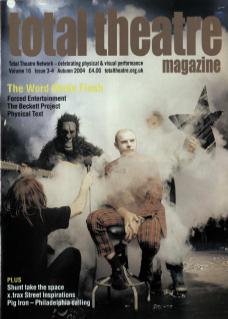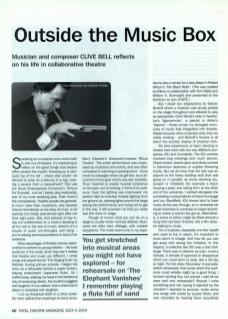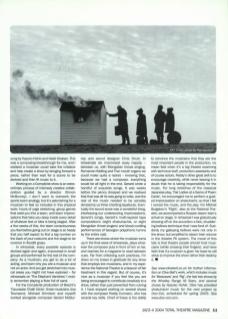Speaking as a musician who works both in and out of theatre, it's interesting to reflect on the good things that theatre offers people like myself. Dressing up is obviously top of the list – where else would I be allowed to pose on a balcony in a wig, coaxing a pavane from a harpsichord? This was the Royal Shakespeare Company's School For Scandal, and as I barely play keyboards, one of my most terrifying jobs. Then there's the camaraderie. Theatre people are generally much nicer than musicians, and develop intense friendships at the drop of a hat, to be tearfully but totally abandoned right after the final night party. Still, that process of day in, day out collaboration on a show's devising is all too rare in the rest of music, where's it's a couple of quick run-throughs and bang – you're solving technical problems in front of an audience.
Other advantages of theatre include opportunities to perform to young children – the best audience in the world, since they don't realise that theatre and music are different. I wrote songs and played live for The Singing Turtle by Kabutar, touring primary schools. I began the show as a silhouette behind a paper screen, playing shakuhachi (Japanese flute). As I puffed away, shaking my head in the traditional way of producing vibrato, the audience giggled and laughed. It's so seldom that a shakuhachi player is rewarded with laughter.
I cut my theatrical teeth in a show possibly more radical than anything I've done since, Barry Edwards' Grotowski-inspired Ritual Theatre. The entire performance was improvised by musicians and actors, and was often compared to watching a sporting event – there could be passages where we got lost, but a triumphant three-goal victory was also possible. Thus I learned to create musical coherence on the spot, out of nothing, in front of an audience. Even the lighting was improvised: my brother Neil reinvented theatre lighting from the ground up, carrying lights around the stage during the performance and trying not to get in the way. It still surprises me that you rarely see this done on stage.
Though of course what you can do on a stage is usually rather narrowly defined. Musicians are often kept offstage, with notable exceptions. The most recent one in my experience was a cameo for a saw player in Robert Wilson's The Black Rider. (This was created by Wilson in collaboration with Tom Waits and William S. Burroughs and presented at the Barbican as part of BITE.)
But I recall two adaptations by Steven Berkoff where a musician was simply parked on the stage throughout and allowed to play as appropriate. Colin Wood's cello in Aeschylus's Agamemnon, a pianist in Wilde's Salome – these remain my strongest memories of music fully integrated into theatre. Maybe because when musicians play, they are visibly working – and Berkoff's theatre is all about the ecstatic display of physical work.
My best experiences of team devising in theatre have been with two very different companies, IOU and Complicite. The IOU process involved long meetings and much silence. Clocks ticked, beards grew and ideas evolved in Darwinian slowness or sudden flowering bursts. But we all knew that the talk was an adjunct to the heavy building work that was going on in parallel, as some clanking skyscraper or inflatable (for example a leech housing a jeep) was taking form at the other end of the workshop. I worked alongside the contrasting musical talents of David Humpage and Lou Glandfield. IOU shows tend to have music all the way through, so in rehearsal we would improvise or compose on paper according to where a scene had got to. Alternatively, a scene of action might be fitted around a song that had been finished, like a film director editing to music.
You get stretched into musical areas you might not have explored – for rehearsals on The Elephant Vanishes I remember playing a flute full of sand
For a musician, especially one like myself who used to live in Japan, it's important to know who's in charge. And how far you can get away with taking the initiative. In this respect, a collective like IOU was a real challenge. There was no director as such, more a climate. A climate of approval or disapproval which you could learn to read, like a red sky at night. For the show Boundary it was said, before rehearsals, that tunes which the audience could whistle might be a good thing. I fancied tackling this, but should I wait till we were well into rehearsals? Should I write something and risk having it rejected by the climate? I decided to pounce, wrote some pop songs with words by Louise Oliver, and was rewarded by hearing them beautifully sung by Kazuko Hohki and Nabil Shaban. This was a composing breakthrough for me, and I realised a musician could take the initiative and help create a show by bringing forward a piece, rather than wait for a scene to be devised and then fit music to it.
Working on a Complicite show is an extraordinary process of intensely creative collaboration guided by a director (Simon McBurney). I don't want to overwork the sports team analogy, but it's astonishing for a musician to feel so included in this physical work: hours of yoga stretching, group games that weld you into a team, and team improvisations that take you deep inside every detail of whatever text or idea is being staged. After a few weeks of this, the team consciousness you feel before going out on stage is so heady that you half expect to find a big number on the back of your costume and the stage to be covered in floodlit grass.
In rehearsal, every possible episode is devised again and again, improvised in small groups and performed for the rest of the company. As a musician, you get to do a lot of acting, and learn why you are a musician and not an actor. And you get stretched into musical areas you might not have explored – for rehearsals on The Elephant Vanishes I vividly remember playing a flute full of sand.
For the Complicite production of Brecht's Caucasian Chalk Circle, three musicians (Joe Townsend, Michael Ormiston and myself) worked alongside composer Gerard McBurney and sound designer Chris Shutt. In rehearsals we improvised away happily – between us, with Mongolian throat singing, Romanian fiddling and Thai mouth organs we could make quite a racket – knowing that, because we had a composer, everything would be all right in the end. Gerard wrote a handful of exquisite songs. It was weeks before the penny dropped and we realised that that was all he was going to write, and the rest of the music needed to be sensibly devised by us three chortling layabouts. Eventually the sound score was a wonderful thing, interleaving our underscoring improvisations, Gerard's songs, Gerard's multi-layered tape compositions (eight shakuhachis, or eight Mongolian throat singers) and blood-curdling performances of Georgian polyphonic hymns by the entire cast.
There are shows where the musician turns up in the final week of rehearsals, plays whatever the composer puts in front of him or her, and reaches for a magazine to read between cues. Far from criticising such practices, I'm down on my knees in gratitude for any show that employs live musicians, and in my experience the National Theatre is a beacon of fair treatment in this regard. But of course, it's nice as a musician if you feel like you are being encouraged to contribute creatively to a show, rather than just prevented from ruining it. I have enjoyed working on several shows with the composer Paddy Cunneen, who has several key skills. Chief of these is the ability to convince the musicians that they are the most important people in the production, no mean feat when it's a big theatre swarming with technical staff, production assistants and of course actors. Paddy's other great skill is to encourage creativity, while never leaving it in doubt that he is taking responsibility for the music. For long stretches of the classical Japanese play, Fair Ladies at a Game of Poem Cards, he encouraged me to perform a guided improvisation on shakuhachi, so that I felt I owned the music, and the play. For Mikhail Bulgakov's Flight, also at the National Theatre, we accompanied a Russian steam train's arrival on stage. In rehearsal I was gratuitously showing off on the accordion – a fast, shuddering bellows technique that I was fond of. Suddenly my galloping bellows were not only in the show, but amplified to steam train volume in the theatre PA system. The moral of this tale is that theatre people should trust musicians (while crossing their fingers), and have faith that if a musician is given his head he will strive to improve the show rather than destroy it.
See www.clivebell.co.uk for further information on Clive Bell's work, which includes music for Bedcases and Pig, the last two shows by the Whalley Range All Stars, and several shows by Kazuko Hohki. Clive has provided shakuhachi music for the next project by Doo-Cot, scheduled for spring 2005. See www.doo-cot.com


